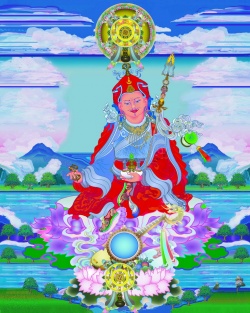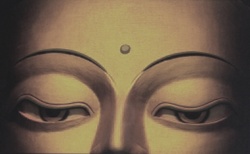Difference between revisions of "Candima Sutta"
| Line 1: | Line 1: | ||
| − | The | + | {{DisplayImages|1649|1778}} |
| − | + | {{Centre|{{Big2x|The Moon Deity's Prayer for Protection]}<br/> | |
| − | translated from the [[Pali]] by | + | translated from the [[Pali]] by <br/> |
| − | + | [[Piyadassi Thera]]}}<br/><br/> | |
| − | [[Piyadassi | ||
[[Thus have I heard]]: | [[Thus have I heard]]: | ||
Revision as of 18:07, 3 April 2014
{{Centre|The Moon Deity's Prayer for Protection]}
translated from the Pali by
Piyadassi Thera
On one occasion the Blessed One was living near Savatthi, at Jetavana at Anathpindika's monastery. At that time Candima, the moon deity, was seized by Rahu, lord of Asura. Thereupon calling to mind the Blessed One, Candima, the moon deity, recited this stanza:
i. "O Buddha, the Hero, thou art wholly free from all evil. My adoration to thee. I have fallen into distress. Be thou my refuge."
Thereupon the Blessed One addressed a stanza to Rahu, Lord of Asuras, on behalf of Candima, thus:
ii. "O Rahu, Candima has gone for refuge to the Tathagata, the Consummate One. Release Candima. The Buddhas radiate compassion on the world (of beings)."
Thereupon Rahu, Lord of Asuras, released Candima, the deity, and immediately came to the presence of Vepacitta, Lord of Asuras, and stood beside him trembling with fear and with hair standing on end. Then Vepacitta addressed Rahu in this stanza.
iii. "Rahu. Why did you suddenly release Candima? Why have you come trembling, and why are you standing here terrified?"
"I have been spoken to by the Buddha in a stanza (requesting me to release Candima). If I had not released Candima my head would have split into seven pieces. While yet I live, I should have had no happiness. (Therefore I released Candima)."

